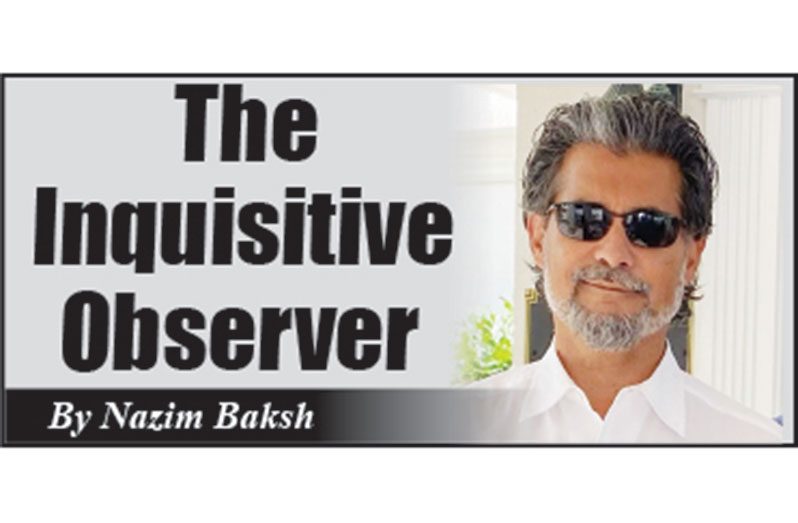IF you were to pass by the noisy and congested corner of Avenue of the Republic and Brickdam one day last week, you might have heard a lot of loud insults coming from inside the Magistrates’ Court and wondered what in the world was going on. The most strident and bellicose voice in Magistrate Faith McGusty’s courtroom on the second floor was that of attorney Eusi Anderson.
He has been defending senior GECOM officials, among others, who are accused of cooking the votes of the 2020 elections to give APNU+AFC a victory when the glaring evidence was that the PPP/C had won the elections. Although he is only one of a chorus of defence attorneys, there is no doubt that Anderson and Nigel Hughes are the ones steering the direction of the cross-examination of the first six witnesses who have taken the stand thus far.
Those witnesses have given riveting eyewitness testimony of what they saw and heard from Keith Lowenfield, Clairmont Mingo and Roxanne Myers (by now, readers should be familiar with their names and their roles in GECOM) and political operatives with the PNCR and AFC, in the tabulation room of Ashmin’s Building in Georgetown. And so far, after hours and days of cross-examination, there has been zero attempt to challenge the evidence they’ve presented.
Defence attorneys have a range of strategies at their disposal to challenge evidence presented by prosecutors. They could choose to pursue inconsistencies in testimony, contradictory evidence, an alibi or memory loss. Even a witness’s criminal record or history of dishonesty is all fair game. But this is not what Anderson, Hughes, Darren Wade and Dr. Dexter Todd are determined to win this case on.
In simple terms, their game, and they’ve got no game really, but I am being generous, is to poke repeatedly at every witness in a desperate attempt to prove that because they support President Irfaan Ali and the PPP/C it means, therefore, that they are unreliable witnesses at best, and liars, sycophants, toadies, yes-men and women, at worse. Is it working on Magistrate McGusty? Impossible for me to say at this point. She has been mostly spot-on so far, unlike her predecessor, who was assigned to this trial before personal health circumstances caused her to step aside.
But what about the substantive evidence presented in court? Anderson and Hughes are unfazed. They’ve cashed in their chips and are putting their bets on a one-trick pony. Just last week, they went after Kit Nascimento, a 93-year-old man of letters. Despite his advanced age, he was no pushover. During the 2020 elections, Nascimento was an independent observer with the Private Sector Commission, which gave him a front row seat at the Ashmin’s Building.
Nascimento testified that he objected repeatedly when the accused set aside the Statements of Poll (SOPs) in contravention of the laws and instead, invented a spreadsheet, which you might have heard, was displayed on a bedsheet at one point. When the tabulations weren’t matching the SOPs, alarm bells could be heard ricocheting across Guyana and the blue Caribbean waters. International observers and members of the diplomatic corps began sending dispatches to Washington D.C., Ottawa, London and the capital cities of CARICOM nations. “Democracy was beginning to slip away in oil-rich Guyana.”
Nascimento was livid, and he voiced his concerns and wrote letters. He wasn’t shy about who he thought was responsible for the entire charade. Anderson asked Nascimento whether he had compared former President David Granger to Idi Amin, a question that holds no relevance to his testimony. The magistrate warned Anderson repeatedly to refrain from bringing up former President Granger, who had filed a lawsuit against Nascimento, a matter still before the courts.
“No,” Nascimento replied, though he did criticise Granger’s security arrangements at the time, calling them reminiscent of authoritarian regimes. Had he ever written similarly about President Irfaan Ali or Vice President Bharrat Jagdeo? Anderson shouted. “No,” Nascimento said. Anderson used every opportunity to mock and ridicule Nascimento. There was something cruel about the exchanges, and Magistrate McGusty tried several times to wrestle back control of her courtroom from Anderson, with little to no luck.
Nascimento was asked for his legal opinion of the Granger government following the December 2018 no-confidence vote. He responded, “I am not a legal expert.” Anderson asked him for his opinion as to whether the Granger’s administration was “squatting in office” when it refused to immediately call for an election. Nascimento asked him to define what he meant by “squatting.”
Back and forth it went between Anderson and Nascimento, and whenever Nascimento would exhaust Anderson, Hughes would chime in to bail him out. It was a tag team wrestling match in the courtroom. How could Nascimento be impartial and tell the truth if he were an agent of the PPP/C? Nascimento’s response: “That is totally offensive and insulting.”
Courtrooms aren’t supposed to be campaign stops for attorneys with political aspirations. Courtrooms exist to dispense justice, not allow lawyers to indulge in theatrics. Magistrate McGusty might do well to haul the young, brash Anderson and the presidential aspirant, Hughes, into her chamber and inform them that she will not tolerate them using her courtroom to campaign for their political party.
DISCLAIMER: The views and opinions expressed in this column are solely those of the author and do not necessarily reflect the official policy or position of the Guyana National Newspapers Limited.



.jpg)








